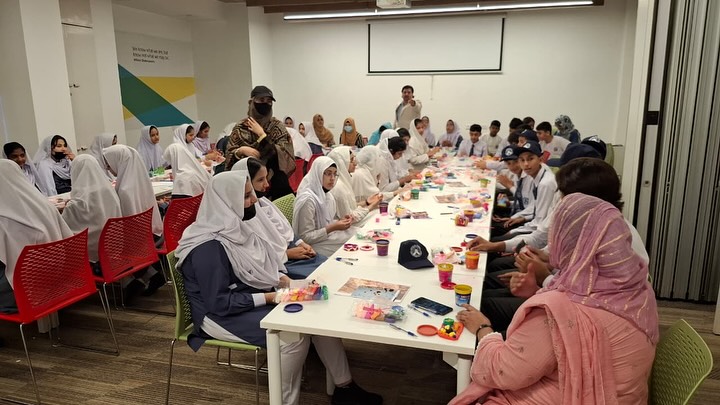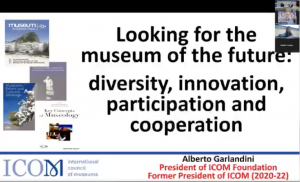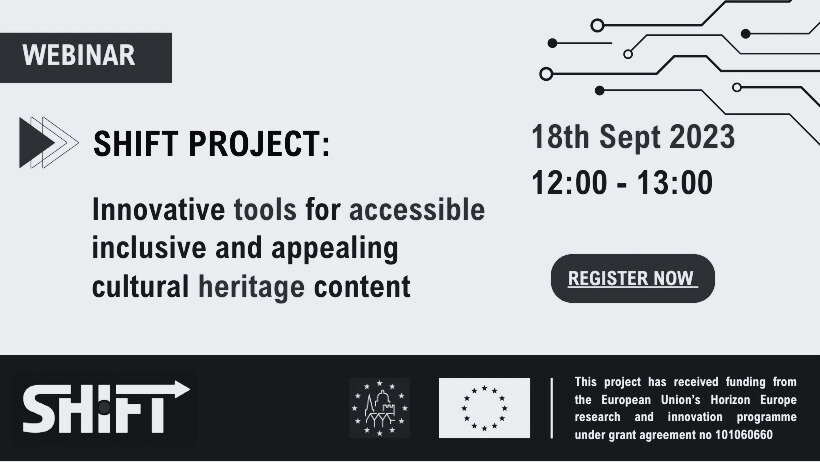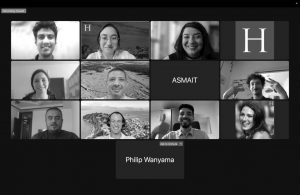: Webinar
Celebrating Cultural Heritage in Lahore
In August 2025, Lahore hosted two events that celebrated Pakistan’s rich heritage and explored innovative approaches to its preservation with the participation of our Preservation of Buddhist Rock Reliefs in the Swat Valley project.
At the British Council Library in Lahore, school students from across the city took part in an interactive session designed to introduce them to the Gandhara civilisation and its artistic legacy. Organised under the project “Preservation of the Buddhist Rock Reliefs in the Swat Valley: Digital Documentation, First-Aid Conservation, and Climate Change Adaptation,” the initiative forms part of the British Council’s Cultural Protection Fund (CPF) and was implemented in collaboration with national and international partners, including the Directorate of Archaeology and Museums, Khyber Pakhtunkhwa, the Italian Archaeological Mission to Pakistan, The Heritage Management Organization, and Essanoor Associates.
During the session, students engaged in creative workshops that encouraged exploration of heritage, history, and environmental awareness. They painted tote bags inspired by Gandharan motifs and crafted clay replicas of artefacts. The programme successfully combined artistic expression with educational enrichment, fostering both appreciation and curiosity for cultural preservation.
On the same day, the Lahore Museum hosted an International Panel Discussion entitled “The Future Museum: Technology, Heritage Conservation, and Inclusive Innovation.” The event was supported by ICOM, UNESCO, Essanoor Associates, the Heritage Management Organization, and the Tourism, Archaeology and Museum Department, and featured experts including Dr. Cristina Mengazzi (UNESCO), Alberto Garlandini (ICOM Foundation), Ar. Kashif Essa, and Malik Magsood, with moderation by Zainab Sabri, the Museum Education Officer. The panel examined the evolving role of museums, highlighting how technological advancements, innovative curation strategies, and inclusive practices can make cultural institutions more accessible and sustainable. Discussions also addressed local challenges and opportunities, bridging international perspectives with Pakistan’s heritage context. Th recording is available on Lahore Museum’s Facebook page.
Both were fantastic initiatives which illustrated Lahore’s multi-faceted approach to cultural engagement, demonstrating how hands-on educational programmes for young learners can complement professional dialogues on innovation and preservation.
SHIFT Project Webinar: accessible & inclusive cultural heritage content
Join us for a webinar to celebrate this year’s European Heritage Days organized by SHIFT, an international project funded by the European Commission’s Horizon Europe Program to make cultural heritage more inclusive and accessible through technology.
SHIFT’s (MetamorphoSis of cultural Heritage Into augmented hypermedia assets For enhanced accessibiliTy and inclusion)online event will explore the innovative tools being developed by the SHIFT Consortium to improve the accessibility, inclusivity, and appeal of cultural heritage content. It will be held on September 18th, 11 AM CET.
SHIFT is one of a cluster of six projects funded by the European Commission’s Horizon Europe Program under Cluster 2 Culture, Creativity, and Inclusive Society: Preserving and enhancing cultural heritage with advanced digital technologies. SHIFT supports the adoption of digital transformation strategies and the uptake of tools within the creative and cultural industries (CCI).
The webinar is addressed to cultural heritage professionals, researchers, and the public. To attend, participants can register by filling out this form.
SHIFT PROJECT: The SHIFT Consortium’s 13 partners are leveraging advances in Artificial Intelligence (AI) and Machine Learning (ML) to improve cultural heritage access for European citizens experiencing sensory impairment. They aim to enrich the experience of interacting with cultural assets through visual, auditory, and sensory modalities, e.g., using haptics. SHIFT is also developing tools and methodologies to enable contemporary description of cultural assets through language evolution models. HERITΛGE is proud to be a part of the SHIFT Consortium. To find out more about SHIFT, please watch this introductory video.
European Cultural Heritage Days: Every September, the signatory States to the European Cultural Convention take part in the European Heritage Days – a joint action of the Council of Europe and the European Commission. The action’s aims are, among others, to raise the awareness of European citizens to the richness and cultural diversity of Europe and invite responses to the social, political and economic challenges it faces.
More about SHIFT: https://shift-europe.eu/
Highlights from our Summer School: Digital Tools for Cultural Heritage Management
In May and June 2023, HERITΛGE’s Online Summer School on Digital Tools for Cultural Heritage Management brought together 14 heritage managers from Africa, Asia, and Europe. Led by Dr. Cornelis Stal, this annual immersive program aims to equip participants with advanced skills in GIS, Photogrammetry and image-based 3D modeling, and laser scanning.
Let’s delve into the key highlights and the impact of this transformative experience.
GIS: Unlocking the Power of Spatial Data in Heritage Management
Geographic Information Systems (GIS) play a crucial role in cultural heritage management. During the summer school, participants were introduced to open-source GIS software and gained insights into transforming manuscript plans into comprehensive geographical databases. The importance of cartography in heritage preservation was emphasized. Through hands-on instruction, participants learned practical techniques and implemented them in real-life scenarios, enabling them to harness the power of GIS for effective cultural heritage management.
Photogrammetry and Image-based 3D Modeling: Capturing Heritage in Three Dimensions
Photogrammetry and image-based 3D modeling provide an immersive and detailed way to document and preserve cultural heritage. Participants in the summer school familiarized themselves with various digital tools, such as photography, photogrammetry, 3D modeling, and model referencing. From image acquisition to data processing and model publishing, the entire workflow was covered. Participants were provided with a free license for Agisoft Metashape Professional, allowing them to create their own 3D models. This hands-on experience equipped them with the skills to capture heritage sites in stunning detail and share them with the world.
Terrestrial Laser Scanning: Unveiling the Secrets of Ancient Sites
Terrestrial laser scanning is a cutting-edge technique for acquiring precise and detailed point clouds of archaeological sites. In this specialist course, participants learned the principles and best practices of laser scanning. With a focus on 3D recording for conservation purposes, heritage managers gained the ability to create accurate representations of historic locations. This technology has the potential to revolutionize how heritage sites are documented and preserved, ensuring their legacy for future generations.
Case Studies: Putting Skills into Action
To apply their newly acquired skills, participants selected their own projects as case studies. This personalized approach allowed them to address specific challenges and gain practical experience. Projects ranged from the Roman Theatre at Palmyra in Syria to the Fort Jesus Heritage Site in Mombasa, Kenya. Each participant had the opportunity to work on their project using the digital tools and techniques they learned, making the summer school experience directly relevant to their work.
The success of our Digital Tools Summer School, that takes place annually online and in person, owes much to the expertise of Dr. Cornelis Stal, Lecturer at the Ghent University College (Department of Real Estate and Land Surveying), and Visiting Professor at the Ghent University (Department of Geography) with a significant experience in the field.
This year’s graduates are already putting their newfound expertise into action, ensuring the preservation of iconic sites for future generations.
HERITΛGE is already receiving applications for next year’s summer school and is still accepting applications for its Certificate in Digital Tools for Cultural Heritage Management, let by Dr. Stal and run in cooperation with HOGENT University.
What can cultural heritage do for business in Africa?
HERITΛGE celebrated African Heritage Day on May 5th by taking part in an online webinar organized by the Women in Africa Initiative (WIA). WIA is the leading international platform for the economic development and support of African women entrepreneurs and, accordingly, the topic under discussion was whether preserving a country’s heritage assets can serve as the basis for building a successful business.
Dr. Evangelos Kyriakidis, HERITΛGE Director, and the organization’s Head of Africa Programmes, Mina Morou, both contributed to the webinar which was moderated by Oluwatoyin Adegbite-Moore, Founder & CEO of Nigeria’s SHEAFAM & TAM, a consulting business, and Executive Vice-President for Africa & Europe, for financial services company REACH HQ.
They were joined on the panel by Harriet Ng’Ok, Founder of Harriet’s Botanicals and HERITΛGE alumna, and Zaahirah Muthy, Founder OF ZeeArts Gallery, philanthropist, artist activist, and WIA Ambassador.
Adegbite-Moore kicked off the discussion by asking whether heritage can help business and how can business help heritage.
“In many ways, heritage consists of unique content, of privileged knowledge for local communities anywhere. And this privileged knowledge can become a unique selling point for business and can help business branding, business quality, etc. while at the same time, business with its products and services can actually really strengthen these heritage values and empower them,” said Dr. Kyriakidis.
Ng’Ok founded Harriet’s Botanicals, an African-sourced wellness products company, after being helped herself by her community’s traditional medicine that uses locally-found plants. She joined the discussion from Kenya.
“My idea was to bring cultural practitioners together and formalize their trade… we have grown in leaps and bounds. We now have a factory and manufacture up to 500 bottles on any given day … We are the beginning of African medicine featuring on a global platform just like other cultures, like the Chinese and the Ayurvedic are,” Ng’Ok said.
“The reason I named our first product Arorwet and maintained the name of this tree is that people in the village would begin to understand the value of the traditional indigenous trees and not cut them for firewood or for sale and would start instead to regrow them on their farms,” she added.
Below you can find out more and watch the webinar which was on the day attended by around 1000 people on the day.
ABOUT AFRICAN WORLD HERITAGE DAY: Proclaimed by UNESCO in 2015, African World Heritage Day (5 May) is an opportunity for people around the world, particularly Africans, to celebrate the Continent’s unique cultural and natural heritage. While Africa is underrepresented on the World Heritage List (African properties account for some 12% of all inscribed sites worldwide), a disproportionally high percentage (39%) of these properties are on the World Heritage List in Danger. It is therefore more urgent than ever that this irreplaceable heritage be protected and preserved for the enjoyment of future generations.
HERITΛGE is currently working to untap the potential of heritage in Africa through its Heritage Management Project – Africa (HerMaP-Africa) program which is funded by the Mellon Foundation’s Humanities in Place program and through its HerMaP Gambia program which is co-funded by the European Union.







